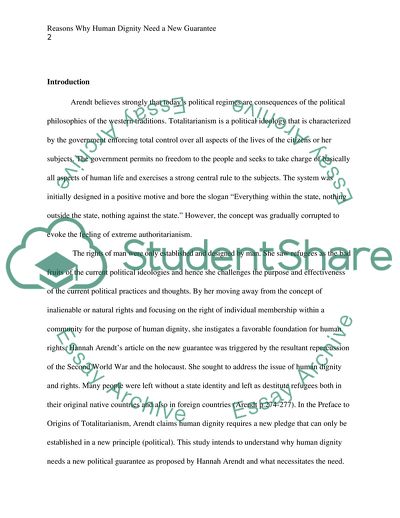Cite this document
(Totalitarianism: Reasons Why Human Dignity Need a New Guarantee Essay Example | Topics and Well Written Essays - 2000 words, n.d.)
Totalitarianism: Reasons Why Human Dignity Need a New Guarantee Essay Example | Topics and Well Written Essays - 2000 words. https://studentshare.org/politics/1787887-in-the-preface-to-origins-of-totalitarianism-arendt-claims-human-dignity-needs-a-new-guarantee-which-can-be-found-only-in-a-new-political-principle-in-a-new-law-on-earth-ot-ixxxvii-why-does-human-dignity-need-a-new-guarantee-and-do-you-think
Totalitarianism: Reasons Why Human Dignity Need a New Guarantee Essay Example | Topics and Well Written Essays - 2000 words. https://studentshare.org/politics/1787887-in-the-preface-to-origins-of-totalitarianism-arendt-claims-human-dignity-needs-a-new-guarantee-which-can-be-found-only-in-a-new-political-principle-in-a-new-law-on-earth-ot-ixxxvii-why-does-human-dignity-need-a-new-guarantee-and-do-you-think
(Totalitarianism: Reasons Why Human Dignity Need a New Guarantee Essay Example | Topics and Well Written Essays - 2000 Words)
Totalitarianism: Reasons Why Human Dignity Need a New Guarantee Essay Example | Topics and Well Written Essays - 2000 Words. https://studentshare.org/politics/1787887-in-the-preface-to-origins-of-totalitarianism-arendt-claims-human-dignity-needs-a-new-guarantee-which-can-be-found-only-in-a-new-political-principle-in-a-new-law-on-earth-ot-ixxxvii-why-does-human-dignity-need-a-new-guarantee-and-do-you-think.
Totalitarianism: Reasons Why Human Dignity Need a New Guarantee Essay Example | Topics and Well Written Essays - 2000 Words. https://studentshare.org/politics/1787887-in-the-preface-to-origins-of-totalitarianism-arendt-claims-human-dignity-needs-a-new-guarantee-which-can-be-found-only-in-a-new-political-principle-in-a-new-law-on-earth-ot-ixxxvii-why-does-human-dignity-need-a-new-guarantee-and-do-you-think.
“Totalitarianism: Reasons Why Human Dignity Need a New Guarantee Essay Example | Topics and Well Written Essays - 2000 Words”. https://studentshare.org/politics/1787887-in-the-preface-to-origins-of-totalitarianism-arendt-claims-human-dignity-needs-a-new-guarantee-which-can-be-found-only-in-a-new-political-principle-in-a-new-law-on-earth-ot-ixxxvii-why-does-human-dignity-need-a-new-guarantee-and-do-you-think.


